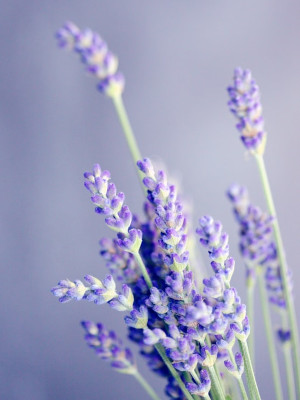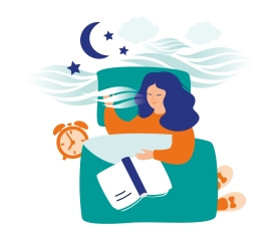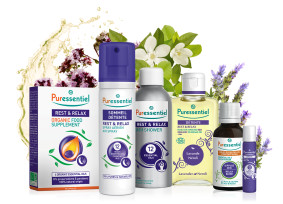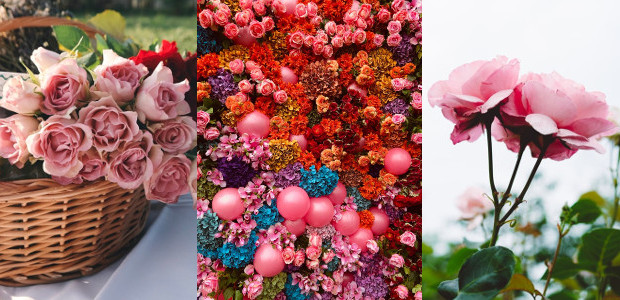Blog… Sweet Slumber by Dr Chris Etheridge, including his top 5 tips for a good night’s sleep & recognising World Sleep Day, recognising sleep and it’s important impact on our health. (In asscoiation with Puressentiel…

SWEET SLUMBER
Dr Chris Etheridge, uk.puressentiel.com
Sleep is fundamental to our health and wellness, no doubt about it. But a lack of sleep runs much, much deeper than just feeling tired the next day. It can impact every aspect of health and wellbeing. From impacting the immune system to a greater risk of depression and anxiety[1], pain problems, and an increased risk of heart disease,[2] diabetes[3] and some cancers.[4],[5]
And with research[6] from Puressentiel showing that 83% of us have suffered with sleep issues at some point in our lives, most of us know exactly how it feels to not to be firing on all cylinders.
In fact, the research shows that the immediate effects are felt by most, with three quarters saying sleepless nights makes it difficult to deal with daily life and half saying they are grumpy.
It’s important to remember that it’s not all about the length of sleep. Quality of sleep is crucial. During the deepest part of the sleep cycle, the body works to repair and nourish itself.
We also have to remember that with the COVID-19 restrictions and lockdowns, we’ve probably all experienced a change in our sleep pattern – be it getting more sleep because of no commute, getting less sleep because of increasing stress and anxiety, or interrupted sleep as our minds don’t seem to want to switch off – or simply for no unreason.
But what can we do to maximize our chances of getting a good night’s sleep? Here are my top 5 tips to help get that ‘sweet slumber’:
Dr Chris Etheridge, uk.puressentiel.com
Top 5 Tips:

#1. Don’t force it: This is a strange period we are living through, and you may experience a slight alteration to your sleep as a consequence. And we all know the more we tell ourselves to sleep the more it doesn’t happen. If you have been lying in bed for a while and haven’t fallen asleep, don’t force it. Get up, get some water and distract yourself by doing something relaxing like reading, then try again.
#2. Get a helping hand from nature: We all might need a little help getting to sleep as we go back to normal life. Either with our sleeping pattern or being able to switch off and fall asleep. Lavender has been used as a sleep aid for centuries, and it is acknowledged as a soporific and relaxant by both the European Medicines Agency[7] and the World Health Organization.[8] Try Puressentiel Rest & Relax Air Spray, a combination of 12 pure essential oils including True Lavender, Rosewood and Roman Chamomile.
#3. Exercise: There’s no better way to help with relaxation and stress than some exercise. When we exercise, we release happy hormones called endorphins which makes us feel positive. We also expend energy which will help us feel naturally tired and ready for sleep. Exercising also gives our mind some time to work through things, which will help with worries.
#4. Make time to relax: The day can be full on, and even if it is manageable your mind might still be working overtime with different thoughts. Make sure you put aside some time for yourself each day, even if only 10 minutes. Try to incorporate something you love into each day.
#5. Talk: Talking or sharing our concerns can help us deal with them. Friends may have advice, or simply just airing your feelings can make you feel better. You may find many others may share the same views or worries. If anxiety or sleep problems persist visit your GP.

[1] www.nhs.uk/live-well/sleep-and-tiredness/why-lack-of-sleep-is-bad-for-your-health/
[2] www.ncbi.nlm.nih.gov/pmc/articles/PMC4791534/
[3] www.ncbi.nlm.nih.gov/pmc/articles/PMC2976532/
[4] www.ncbi.nlm.nih.gov/pubmed/30463535
[5] www.ncbi.nlm.nih.gov/pmc/articles/PMC6025900/
[6] A Ginger Comms omnibus survey of 1,535 adults, Autumn 2020
[7] www.ema.europa.eu/documents/herbal-report/draft-assessment-report-lavandula-angustifolia-mill-aetheroleum-lavandula-angustifolia-mill-flos_en.pdf
[8] apps.who.int/medicinedocs/documents/s14213e/s14213e.pdf#page=227










